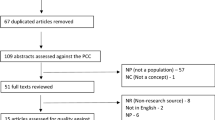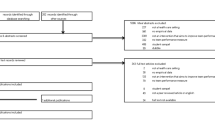Abstract
Purpose
Retention of skills and knowledge has been shown to be poor after resuscitation training. The effect of a “booster” is controversial and may depend on its timing. We compared the effectiveness of an early versus late booster session after Basic Life Support (BLS) training for skill retention at 4 months.
Methods
We performed a single-blind randomized controlled trial in a simulation environment. Eligible participants were adult laypeople with no BLS training or practice in the 6 months prior to the study. We provided participants with formal BLS training followed by an immediate BLS skills post-test. We then randomized participants to one of three groups: control, early booster, or late booster. Based on their group allocation, participants attended a brief BLS refresher at either 3 weeks after training (early booster), at 2 months after training (late booster), or not at all (control). All participants underwent a BLS skills retention test at 4 months. We measured BLS skill performance according to the Heart and Stroke Foundation’s skills testing checklist for adult CPR and the use of an automated external defibrillator.
Results
A total of 80 laypeople were included in the analysis (control group, n = 28; early booster group, n = 23; late booster group, n = 29). The late booster group achieved better skill retention (mean difference in checklist score at retention compared to the immediate post-test = – 0.8 points out of 15, [95% CI – 1.7, 0.2], P = 0.10) compared to the early booster (– 1.3, [– 2.6, 0.0], P = 0.046) and control group (– 3.2, [– 4.7, – 1.8], P < 0.001).
Conclusion
A late booster session improves BLS skill retention at 4 months in laypeople.
Trial registration number: NCT02998723.
Résumé
Objectif
Il a été démontré que la rétention des compétences et des connaissances est faible après une formation en réanimation. L'effet d'un "booster" est controversé et peut dépendre de son moment. Nous avons comparé l'efficacité d'une session de rappel précoce ou tardive après la formation Basic Life Support (BLS) pour le maintien des compétences après quatre mois.
Méthodes
Nous avons réalisé un essai contrôlé randomisé en simple aveugle dans un environnement de simulation. Les participants éligibles étaient des laïcs adultes n'ayant pas suivi de formation ou pratiqué le BLS dans les 6 mois précédant l'étude. Nous avons fourni aux participants une formation BLS formelle suivie d'un post-test immédiat sur les compétences BLS. Nous avons ensuite randomisé les participants dans l'un des trois groupes suivants: groupe témoin, rappel précoce ou rappel tardif. En fonction de leur répartition dans le groupe, les participants ont assisté à un bref rappel de BLS soit 3 semaines après la formation (rappel précoce), soit 2 mois après la formation (rappel tardif), soit pas du tout (groupe témoin). Tous les participants ont été soumis à un test de maintien des compétences BLS après quatre mois. Nous avons mesuré la performance des compétences BLS selon la liste de contrôle des compétences de la Fondation des maladies du cœur pour la RCP chez l'adulte et l'utilisation d'un défibrillateur externe automatisé.
Résultats
Au total, 80 profanes ont été inclus dans l'analyse (groupe témoin, n = 28; groupe de rappel précoce, n = 23; groupe de rappel tardif, n = 29). Le groupe de rappel tardif a obtenu un meilleur maintien des compétences (différence moyenne du score de la liste de contrôle au moment du maintien par rapport au post-test immédiat = -0,8 points sur 15, [IC 95% -1,7, 0,2], P = 0,10) par rapport au groupe de rappel précoce (-1,3, [-2,6, 0,0], P = 0,046) et au groupe témoin (-3,2, [-4,7, -1,8], P < 0,001).
Conclusion
Une session de rappel tardive améliore la rétention des compétences BLS à 4 mois chez les profanes.




Similar content being viewed by others
References
van Diepen S, Girotra S, Abella BS, Becker LB, Bobrow BJ, Chan PS, et al. Multistate 5-year initiative to improve care for out-of-hospital cardiac arrest: primary results from the HeartRescue project. J Am Heart Assoc. 2017;6(9): e005716. https://doi.org/10.1161/JAHA.117.005716.
Berger S. Survival from out-of-hospital cardiac arrest: are we beginning to see progress? J Am Heart Assoc. 2017;6(9): e007469. https://doi.org/10.1161/JAHA.117.007469.
Eckstein M, Stratton SJ, Chan LS. Cardiac Arrest Resuscitation Evaluation in Los Angeles: CARE-LA. Ann Emerg Med. 2005;45(5):504–9. https://doi.org/10.1016/j.annemergmed.2004.11.024.
Herlitz J, Engdahl J, Svensson L, Angquist K-A, Young M, Holmberg S. Factors associated with an increased chance of survival among patients suffering from an out-of-hospital cardiac arrest in a national perspective in Sweden. Am Heart J. 2005;149(1):61–6. https://doi.org/10.1016/j.ahj.2004.07.014.
Mundell WC, Kennedy CC, Szostek JH, Cook DA. Simulation technology for resuscitation training: a systematic review and meta-analysis. Resuscitation. 2013;84(9):1174–83. https://doi.org/10.1016/j.resuscitation.2013.04.016.
Mosley C, Dewhurst C, Molloy S, Shaw BN. What is the impact of structured resuscitation training on healthcare practitioners, their clients and the wider service? A BEME systematic review: BEME Guide No. 20. Med Teach. 2012;34(6):e349–85. https://doi.org/10.3109/0142159X.2012.681222
Abella BS, Alvarado JP, Myklebust H, Edelson DP, Barry A, O’Hearn N, et al. Quality of cardiopulmonary resuscitation during in-hospital cardiac arrest. JAMA. 2005;293(3):305–10. https://doi.org/10.1001/jama.293.3.305.
Wik L, Kramer-Johansen J, Myklebust H, Sørebø H, Svensson L, Fellows B, et al. Quality of cardiopulmonary resuscitation during out-of-hospital cardiac arrest. JAMA. 2005;293(3):299–304. https://doi.org/10.1001/jama.293.3.299.
Sutton RM, Niles D, Nysaether J, Abella BS, Arbogast KB, Nishisaki A, et al. Quantitative analysis of CPR quality during in-hospital resuscitation of older children and adolescents. Pediatrics. 2009;124(2):494–9. https://doi.org/10.1542/peds.2008-1930.
Batcheller AM, Brennan RT, Braslow A, Urrutia A, Kaye W. Cardiopulmonary resuscitation performance of subjects over forty is better following half-hour video self-instruction compared to traditional four-hour classroom training. Resuscitation. 2000;43(2):101–10. https://doi.org/10.1016/s0300-9572(99)00132-x.
Spooner BB, Fallaha JF, Kocierz L, Smith CM, Smith SCL, Perkins GD. An evaluation of objective feedback in basic life support (BLS) training. Resuscitation. 2007;73(3):417–24. https://doi.org/10.1016/j.resuscitation.2006.10.017.
Mhyre JM, Ramachandran SK, Kheterpal S, Morris M, Chan PS. Delayed time to defibrillation after intraoperative and periprocedural cardiac arrest. Anesthesiology. 2010;113(4):782–93. https://doi.org/10.1097/ALN.0b013e3181eaa74f.
Chan PS, Krumholz HM, Nichol G, Nallamothu BK. Delayed time to defibrillation after in-hospital cardiac arrest. N Engl J Med. 2008;358(1):9–17. https://doi.org/10.1056/NEJMoa0706467.
Anderson R, Sebaldt A, Lin Y, Cheng A. Optimal training frequency for acquisition and retention of high-quality CPR skills: a randomized trial. Resuscitation. 2019;135:153–61. https://doi.org/10.1016/j.resuscitation.2018.10.033.
Bender J, Kennally K, Shields R, Overly F. Does simulation booster impact retention of resuscitation procedural skills and teamwork? J Perinatol. 2014;34(9):664–8. https://doi.org/10.1038/jp.2014.72.
Kaczorowski J, Levitt C, Hammond M, Outerbridge E, Grad R, Rothman A, et al. Retention of neonatal resuscitation skills and knowledge: a randomized controlled trial. Fam Med. 1998;30(10):705–11.
Li Q, Zhou R, Liu J, Lin J, Ma E-L, Liang P, et al. Pre-training evaluation and feedback improved skills retention of basic life support in medical students. Resuscitation. 2013;84(9):1274–8. https://doi.org/10.1016/j.resuscitation.2013.04.017.
Rohrer D, Pashler H. Increasing retention without increasing study time. Curr Dir Psychol Sci. 2007;16(4):183–6.
Cepeda NJ, Pashler H, Vul E, Wixted JT, Rohrer D. Distributed practice in verbal recall tasks: a review and quantitative synthesis. Psychol Bull. 2006;132(3):354–80. https://doi.org/10.1037/0033-2909.132.3.354.
Heart and Stroke Foundation of Canada [Internet]. c2021. Basic Life Support (BLS); 2019 [cited 2019 Nov 8]. Available from: https://cpr.heartandstroke.ca/s/bls?language=en_US
Sutton RM, Niles D, Meaney PA, et al. Low-dose, high-frequency CPR training improves skill retention of in-hospital pediatric providers. Pediatrics. 2011;128(1):e145–51. https://doi.org/10.1542/peds.2010-2105.
Sobel HS, Cepeda NJ, Kapler IV. Spacing effects in real-world classroom vocabulary learning. Appl Cogn Psychol. 2011;25(5):763–7. https://doi.org/10.1002/acp.1747.
Xue G, Mei L, Chen C, Lu Z-L, Poldrack R, Dong Q. Spaced learning enhances subsequent recognition memory by reducing neural repetition suppression. J Cogn Neurosci. 2011;23(7):1624–33. https://doi.org/10.1162/jocn.2010.21532.
Moulton C-AE, Dubrowski A, Macrae H, Graham B, Grober E, Reznick R. Teaching surgical skills: what kind of practice makes perfect?: a randomized, controlled trial. Ann Surg. 2006;244(3):400–409. https://doi.org/10.1097/01.sla.0000234808.85789.6a
Schulz KF, Altman DG, Moher D. CONSORT 2010 Statement: updated guidelines for reporting parallel group randomised trials. BMC Med. 2010;8:18. https://doi.org/10.1186/1741-7015-8-18.
Cheng A, Kessler D, Mackinnon R, Chang TP, Nadkarni VM, Hunt EA, et al. Reporting guidelines for health care simulation research: extensions to the CONSORT and STROBE statements. Adv Simul (London, England). 2016;1:25. https://doi.org/10.1186/s41077-016-0025-y.
González-Salvado V, Rodríguez-Ruiz E, Abelairas-Gómez C, Ruano-Raviña A, Peña-Gil C, González-Juanatey JR, et al. Training adult laypeople in basic life support. A systematic review. Rev Esp Cardiol (Engl Ed). 2020;73(1):53–68. https://doi.org/10.1016/j.rec.2018.11.013.
Choi HJ, Lee CC, Lim TH, Kang BS, Singer AJ, Henry MC. Effectiveness of mouth-to-mouth ventilation after video self-instruction training in laypersons. Am J Emerg Med. 2010;28(6):654–7. https://doi.org/10.1016/j.ajem.2009.02.015.
Saraç L, Ok A. The effects of different instructional methods on students’ acquisition and retention of cardiopulmonary resuscitation skills. Resuscitation. 2010;81(5):555–61. https://doi.org/10.1016/j.resuscitation.2009.08.030.
Weaver FJ, Ramirez AG, Dorfman SB, Raizner AE. Trainees’ retention of cardiopulmonary resuscitation: how quickly they forget. JAMA. 1979;241(9):901–3. https://doi.org/10.1001/jama.1979.03290350021013.
Boet S, Bould MD, Pigford A, Rössler B, Nambiyah P, Li Q, et al. Retention of basic life support in laypeople: mastery learning vs. time-based education. Prehosp Emerg Care. 2017;21(3):362–377. https://doi.org/10.1080/10903127.2016.1258096
Karpicke JD, Roediger HL. The critical importance of retrieval for learning. Science. 2008;319(5865):966–8. https://doi.org/10.1126/science.1152408.
Bould MD, Naik VN. Teaching how to expect the unexpected: improving the retention of knowledge for rare clinical events. Can J Anaesth. 2009;56(1):14–8. https://doi.org/10.1007/s12630-008-9005-6.
Acknowledgements
This research project was funded by the Royal College of Physicians and Surgeons of Canada through a Medical Education Research Grant. S.B. is also supported by The Ottawa Hospital Anesthesia Alternate Funds Association. The sponsors did not have any role in the design, methods, recruitment, data collection, analysis or preparation of the manuscript. The investigators thank Yannick Frechette for his help in an early stage of the project and Fatima Kazoun, Rosiane Simeon, and Ivy Salter for their help with data collection.
Funding
This work was supported by the Royal College of Physicians and Surgeons of Canada. Dr. Boet was supported by The Ottawa Hospital Anesthesia Alternate Funds Association and the Faculty of Medicine, University of Ottawa with a Tier 2 Clinical Research Chair. The funders did not have a role in study design, data analysis, interpretation of the results, writing the manuscript, or in submitting the article for publication.
Author information
Authors and Affiliations
Corresponding author
Ethics declarations
Conflict of interest
The authors declare no conflicts of interest.
Availability of data and materials
Not applicable.
Code availability
Not applicable.
Ethics approval
Ethical approval obtained from the Ottawa Health Science Network Research Ethics Board (Protocol #: 20150174-01H) and the University of Ottawa Office of Research Ethics and Integrity (H11-16–22).
Consent to participate
Informed consent was obtained from all individual participants included in the study.
Consent for publication
All participants consented to the publishing of their data.
Supplementary Information
Below is the link to the electronic supplementary material.
Rights and permissions
About this article
Cite this article
Boet, S., Waldolf, R., Bould, C. et al. Early or late booster for basic life support skill for laypeople: a simulation-based randomized controlled trial. Can J Emerg Med 24, 408–418 (2022). https://doi.org/10.1007/s43678-022-00291-3
Received:
Accepted:
Published:
Issue Date:
DOI: https://doi.org/10.1007/s43678-022-00291-3




